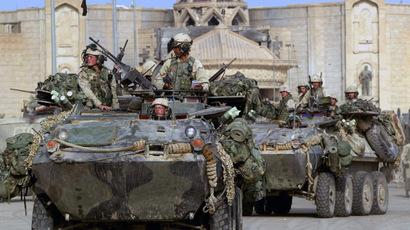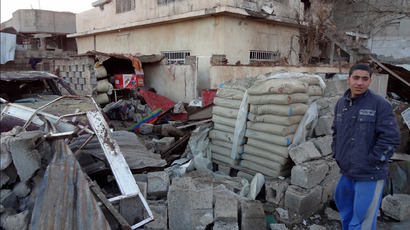
A decade under the yoke of US military and years of ongoing sectarian violence in the shadow of Islamic State threat have nurtured an entire generation of young Iraqis who believe Washington is not a liberator but the prime enemy of their country.
After conducting 250 face-to-face interviews in three Iraqi cities, the Arab Youth Survey has discovered that 93 percent of respondents aged between 18 to 24 years old see the US as an enemy. Only 6 percent of young Iraqis considered it to be an ally, while one percent could not decide.
Hardly surprising that US is seen as the prime source of evil in the country, considering that the young generation has been raised in war and chaos that followed the American invasion of the country in 2003. And while the bulk of US forces left the country in December 2011, they were quick to return in June 2014, to help it defend against the Islamic State.

Since the invasion which led to destruction of state institutions and the rise of lawlessness up to a million Iraqis lost their lives. While statistics greatly differ in numbers, most experts would agree that US forces have left a trail of death, destruction, and instability that materialized into constant sectarian violence and the eventual rise of the Islamic State.
Instability the survey found, is the primary drive for young people joining the ISIS cause across the region, which conducted polls with 3,250 people in 16 countries all over the Arab world. Some 24 percent across the board blamed the lack of jobs for the rise of IS. Further 12 percent blame the US intervention for the rise of ISIS recruitment.
Most young Arabs prioritize stability over democracy five years after the Arab Spring rolled across the Middle East, the poll has found. Only 36 per cent believe the series of uprisings changed their world for the better, compared to 72 percent of optimists back in 2012. Some 53 percent of respondent now believe that promoting stability is more important than promoting democracy, as opposed to 28 percent who support western values.
The Arab Youth Survey found a direct correlation between the youth’s perception of the US in the countries which have suffered from armed conflicts, as opposed to those which US considers their allies in the wider Middle East.
If looking at the general statistics across 16 countries, Arab youth cite Saudi Arabia (31 per cent), UAE (28 per cent), and the United States (25 per cent) as their biggest allies. Overall in the region 63 per cent are saying they consider the US as an ally versus 32 per cent who view it an enemy.

But closer scrutiny of the survey reveals a wider discrepancy. Besides Iraq, countries which have seen American bullets flying over their head, view Washington as their number one enemy.
In Yemen, where the US is providing intelligence for the Saudi-led assault for over a year now, only 10 per cent view Washington as an ally versus 82 per cent as an enemy. In Palestine 16 per cent views Washington as an ally vs. 81 per cent as enemy. The number is somewhat lower in Lebanon, with 65 percent of the country’s youth of the opinion that the US is their country’s enemy.
In Lebanon and Palestine, the youth view US as the backer of Israel, which is seen as the aggressor by the respective young people in the region. In 2006 Israel fought a war with Lebanon with massive airstrikes and artillery fire, in addition to air and naval blockade, and a ground invasion of southern Lebanon. Over 1,100 people, including combatants were killed.
Palestine continues to have bitter relations with Israel and considers it as an occupier with tremendous support from the US. Largely due to special-interest lobbying, US taxpayers provide Israel with more US funds than any other nation. Youth in Palestine continue to fight the Israeli Defense Forces to this day. But all of them remember Operation Cast Lead that resulted in the death of some 1,417 Palestinians and led to widespread destruction.
The survey was carried out by Penn Schoen Berland, a public relations and market research firm, led by controversial strategist Mark Penn, notorious for being the chief strategist for Hillary Clinton’s 2008 largely failed presidential campaign.
Comments
Post a Comment